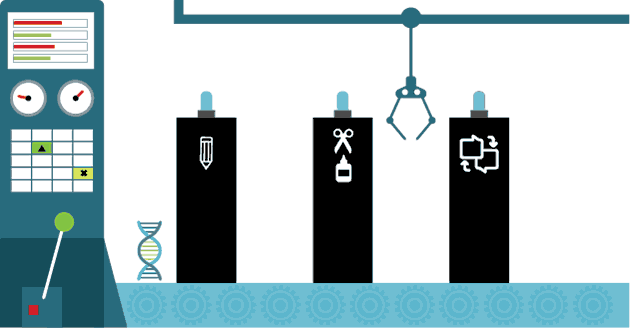
A new, multicenter study led by Fred Hutchinson Cancer Research Center and Memorial Sloan Kettering Cancer Center determined how a single mutation in splicing factor 3b subunit 1 (SF3B1), the most frequently mutated splicing factor gene, drives the formation of many cancers. The findings are published today in the journal Nature.
Dr. Robert Bradley, associate member of Fred Hutch’s Public Health Sciences and Basic Sciences divisions, and Dr. Omar Abdel-Wahab, associate member of Memorial Sloan Kettering’s Human Oncology and Pathogenesis Program, led the study to discover how SF3B1 gene mutations cause cancer. The mutations occur in many cancer types, including:
- Various leukemias
- Myelodysplastic syndromes
- Melanomas
- Breast cancers
- Pancreatic cancers
- Liver cancers
- Bladder cancers
Because SF3B1 encodes a protein that is critical for producing RNA molecules, Bradley and Abdel-Wahab studied RNA sequencing data from hundreds of patients with several different cancer types to search for abnormal RNA molecules. They discovered that the SF3B1 mutation causes cancer cells to produce an abnormal form of the BRD9 RNA molecule that included noncoding DNA sequences or “junk DNA,” which garbled the genetic message. This “junk DNA” originated from a viral element that recently inserted itself into the human genome. Bradley and Abdel-Wahab showed that BRD9 is an important tumor suppressor in many types of cancer, including uveal melanoma (a type of melanoma that affects the eye), chronic lymphocytic leukemia and pancreatic cancer. They then designed therapeutics utilizing CRISPR technology and antisense oligonucleotides to reverse the disease process.
“We know many of the genetic mutations that cause cancer and that mutations in SF3B1, in particular, are strongly associated with many cancer types,” Bradley said. “What’s been unclear is why mutations in SF3B1 are so common and how to best identify treatment options. Thanks to breakthroughs in sequencing technology, computing power and CRISPR genome engineering, we were able to discover how SF3B1 mutations cause cancer and potentially block the process of tumor progression.”
While the research is preclinical (not yet tested in humans), the researchers indicate that there is a strong potential to help cancer patients with the SF3B1 mutation via targeted therapeutics.
“As a physician, the thought of slowing or preventing a patient’s tumor growth by modifying a molecule in their cells is really exciting,” Abdel-Wahab said. “Developing new targeted therapies based on a patient’s individual genetic profile is the key to breakthroughs in precision medicine.”
Bradley and Abdel-Wahab hope to expand their work beyond proof-of-principle experiments and test their concepts with additional cancer types and, eventually, clinical therapy. Several antisense oligonucleotide therapies like the one developed by Bradley and Abdel-Wahab recently received Food and Drug Administration approval, suggesting their therapeutic method may be usable for treating patients.
Funding for this research came from a variety of sources, including the National Institutes of Health (grant numbers P30 CA015704, R01 DK103854 and R01 HL128239), the Department of Defense Bone Marrow Failure Research Program (BM150092 and W81XWH-12-1-0041) and nonprofit organizations including the Leukemia & Lymphoma Society, Evans MDS Foundation and others.
One of the study’s co-authors, Dr. Cigall Kadoch, is a founder, board member and shareholder of Foghorn Therapeutics Inc. Her involvement with the company is unrelated to the current paper.
Source: Read Full Article
